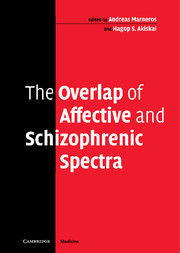Book contents
- Frontmatter
- Contents
- List of contributors
- Preface
- 1 The paradigma of overlapping affective and schizophrenic spectra: schizoaffective conditions
- 2 The overlapping of the spectra: overlapping genes and genetic models
- 3 The continuum of psychosis and its genetic basis
- 4 Functional psychoses: molecular-genetic evidence for a continuum
- 5 State- and trait-related deficits in sustained attention in bipolar disorder: are there any overlaps with schizophrenia?
- 6 The concept of schizoaffective disorder: utility versus validity and reliability – a transcultural perspective
- 7 Phenomenological approaches to the schizoaffective spectrum
- 8 Clinical course of schizoaffective disorders
- 9 Depressive syndromes in schizophrenia
- 10 The overlapping of the spectra: brief and acute psychoses
- 11 Overlapping of the spectra: physical comorbidity between schizophrenia and affective disorders
- 12 The overlapping of the spectra suicide
- 13 Biological treatment of schizoaffective disorders
- 14 Psychological therapies and schizoaffective disorders
- Epilogue: The interface of affective and schizophrenic disorders: a cross between two spectra?
- Index
14 - Psychological therapies and schizoaffective disorders
Published online by Cambridge University Press: 02 September 2009
- Frontmatter
- Contents
- List of contributors
- Preface
- 1 The paradigma of overlapping affective and schizophrenic spectra: schizoaffective conditions
- 2 The overlapping of the spectra: overlapping genes and genetic models
- 3 The continuum of psychosis and its genetic basis
- 4 Functional psychoses: molecular-genetic evidence for a continuum
- 5 State- and trait-related deficits in sustained attention in bipolar disorder: are there any overlaps with schizophrenia?
- 6 The concept of schizoaffective disorder: utility versus validity and reliability – a transcultural perspective
- 7 Phenomenological approaches to the schizoaffective spectrum
- 8 Clinical course of schizoaffective disorders
- 9 Depressive syndromes in schizophrenia
- 10 The overlapping of the spectra: brief and acute psychoses
- 11 Overlapping of the spectra: physical comorbidity between schizophrenia and affective disorders
- 12 The overlapping of the spectra suicide
- 13 Biological treatment of schizoaffective disorders
- 14 Psychological therapies and schizoaffective disorders
- Epilogue: The interface of affective and schizophrenic disorders: a cross between two spectra?
- Index
Summary
Introduction
This chapter explores psychological therapies in schizoaffective disorders. In order to provide a coherent overview the focus will be exclusively on cognitive behavior therapy (CBT). This approach is the most widely investigated adjunctive therapy for severe mental disorders and there have been large-scale randomized controlled treatment trials (RCTs) in acute and chronic schizophrenia, acute and chronic depression, and in moderately severe and highly recurrent and complex bipolar disorders (for a review, see Roth and Fonagy, 1996). As such, a review of the characteristics of this model – and how this can be applied across the spectrum of severe mood and psychotic disorders – can inform thinking on the benefits and drawbacks of dimensional versus categorical approaches to diagnosis. Interestingly, there are only two small-scale contemporary studies of psychological therapy for schizoaffective disorders (Garety et al., 1994; Theilemann, 1993), so much of the chapter will draw on the experiences reported from the clinical manuals of CBT and the RCTs that have included patients with co-existing psychotic and mood symptoms. These patients are more likely to be found in the RCTs of schizophrenia, as the presence of psychotic symptoms is frequently an exclusion criterion in RCTs of CBT in unipolar or bipolar disorders. Depressed mood is a common accompaniment of all phases of schizophrenia and is often one of the primary outcome measures in RCTs of CBT (Fowler et al., 1995).
- Type
- Chapter
- Information
- The Overlap of Affective and Schizophrenic Spectra , pp. 264 - 276Publisher: Cambridge University PressPrint publication year: 2006



